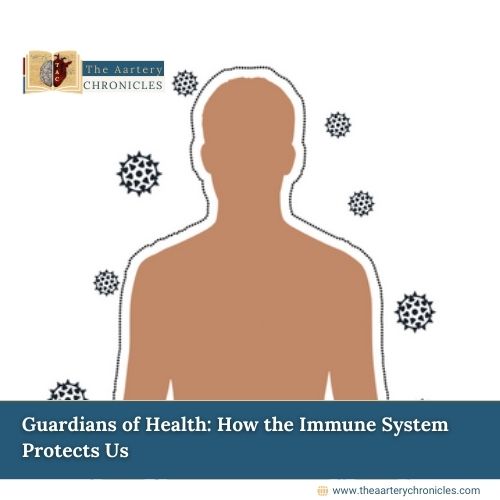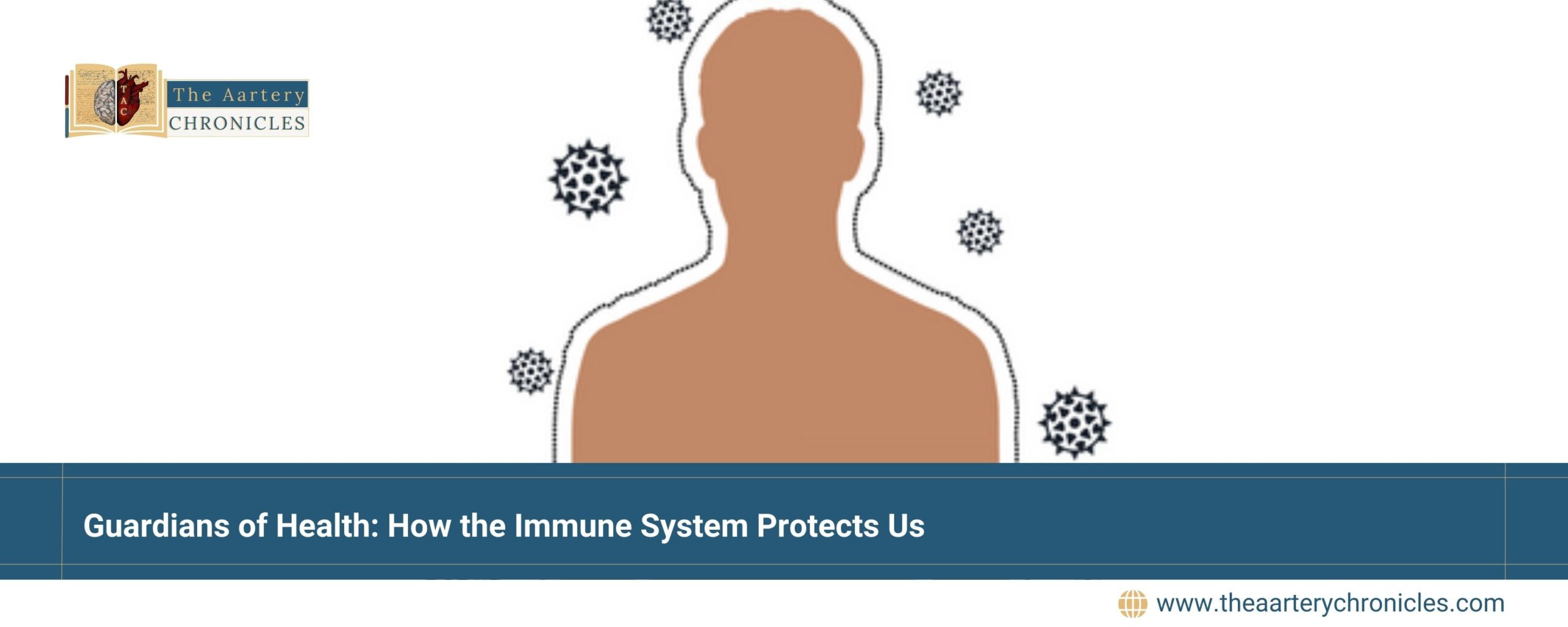

Guardians of Health: How the Immune System Protects Us
Introduction
The immune system is like a fancy network inside our bodies. It’s made up of organs, cells, and proteins that work together to keep us safe from infections and make sure our own cells stay healthy. Basically, it’s the body’s defense team!
Here’s how it works: when it spots Enemies of our body, like bacteria or viruses, it knows how to neutralize them and get rid of them. And here’s the cool part—it remembers these Enemies of our body, so the next time they show up, it can attack them even faster and better. It’s like having a superhero memory!
But sometimes, things can go wrong with the immune system. It can get all out of whack and cause problems like allergies, when it overreacts to harmless things, or immunodeficiencies, when it doesn’t work as well as it should. And then there are autoimmune disorders, when the immune system gets confused and starts attacking our own body tissues. Not cool, immune system, not cool.
So, that’s the immune system in a nutshell. It’s like our body’s own Body Gaurd , fighting off the enemy and keeping us healthy. Pretty amazing, right?
How Do We Weaken Our Immune System?
- Not Getting Enough Sleep: When we don’t get sufficient sleep, our body produces fewer infection-fighting cells and antibodies.
- Dealing with Anxiety and Stress: Long-term stress weakens our immune response, making it more challenging to fight off infections.
- Insufficient Vitamin D Levels: Having low levels of vitamin D can impair our immune function. It’s important
- To get enough sunlight
- Include vitamin D-rich foods in our diet.
- Certain Medications: Some medications can suppress our immune activity, such as
- Corticosteroids
- TNF inhibitors
- Chemotherapy drugs
- Poor Diet: If our diet lacks fruits, vegetables, and essential nutrients like
- Zinc
- Vitamin A
- Vitamin C
- vitamin E
- Smoking and Vaping: The nicotine and other chemicals found in tobacco and e-cigarettes can suppress our immune responses.
- Excessive Alcohol Consumption: Overconsumption of alcohol can reduce the body’s ability to fight infections.
- Grief and Emotional Stress: Prolonged grief or emotional stress can suppress the body’s immune function.
- Lack of Exercise: Sedentary lifestyles reduce immune system efficiency compared to regular aerobic exercise.
- Environmental Factors: Certain factors can also negatively impact immune function such as
- Pollution
- Toxins
- Lack of sunlight exposure
These factors contribute to weakening the body’s defenses against infections and illnesses, highlighting the importance of lifestyle choices and environmental factors in maintaining a robust immune system.
Types of Immune System
The immune system is broadly categorized into two main types: innate immunity and adaptive immunity. Here’s an overview of each type:
- Innate Immunity:
- Description: Innate immunity is the body’s first line of defense against pathogens. It is non-specific, meaning it responds the same way to all types of threats without needing prior exposure to them.
- Components: Includes
- Physical barriers (like skin and mucous membranes)
- Chemical barriers (such as enzymes and acids in the stomach)
- Cellular components (like phagocytes and natural killer cells)
- Function: Innate immunity provides immediate protection by recognizing and eliminating pathogens through general mechanisms that do not require memory or prior exposure.
2. Adaptive Immunity:
- Description: Adaptive immunity is a specific and acquired defense system that develops throughout life in response to exposure to specific pathogens or antigens.
- Components: Involves
- Specialized cells (such as T and B lymphocytes)
- Antibodies (produced by B cells)
- Memory cells (which “remember” previous encounters with specific antigens).
- Function: Adaptive immunity is highly specific, recognizing and targeting particular antigens. It is characterized by immunological memory, enabling the immune system to mount stronger and quicker responses upon subsequent exposures to the same antigen.
These two types of immunity work together to provide comprehensive protection against a wide range of pathogens and maintain the body’s overall health. While innate immunity acts as a rapid initial defense, adaptive immunity offers tailored and long-lasting protection tailored to specific threats encountered by the body.
How can we boost our Immune System?
According to Harvard , here are some evidence-based strategies to improve and support your immune system:
1. Healthy lifestyle choices
- Don’t smoke: Smoking weakens immune function.
- Eat a balanced diet: High in fruits, vegetables, lean proteins, and whole grains.
- Exercise regularly: Helps maintain overall health and supports immune function.
- Maintain a healthy weight: Obesity can impair immune response.
- Drink alcohol in moderation: Excessive alcohol consumption can weaken immune defenses.
- Get adequate sleep: Lack of sleep can negatively impact immune function.
- Practice good hygiene: Wash hands frequently and cook meat thoroughly to avoid infections.
- Vaccinations: Stay up to date with all recommended vaccines to prime your immune system against specific infections.
- Manage Stress: Chronic stress can suppress immune function, so practicing stress-reducing techniques like meditation, yoga, or deep breathing can be beneficial.
- Nutrition: Ensure you’re getting essential nutrients through a well-balanced diet. Consider a daily multivitamin and mineral supplement if your diet lacks variety or you have specific deficiencies.
- Herbs and Supplements: While some may claim to boost immunity, scientific evidence supporting their efficacy is limited. It’s crucial to consult with healthcare professionals before starting any new supplements.
- Cold Exposure: Moderate cold exposure doesn’t weaken the immune system, so dress appropriately for weather conditions without undue concern.
- Age-Related Considerations: As we age, immune response may decline, making vaccinations and healthy lifestyle choices even more critical.
By incorporating these strategies into your daily routine, you can support your immune system effectively. However, it’s important to note that the immune system is complex, and maintaining overall health through these practices contributes to its optimal function rather than “boosting” it beyond its natural capabilities. Always consult with healthcare providers for personalized advice based on your individual health needs.
Conclusion
Understanding and supporting our immune system is crucial for maintaining overall health and resilience against infections. While the concept of “boosting” immunity through specific supplements or practices remains complex and largely unproven, adopting a healthy lifestyle — including balanced nutrition, regular exercise, adequate sleep, stress management, and vaccinations — forms the foundation for optimal immune function. By prioritizing these factors, we not only enhance our body’s natural defenses but also promote longevity and well-being. As research continues to uncover more about the intricacies of immune response, integrating these evidence-based strategies remains our best approach to safeguarding health and vitality throughout life.









